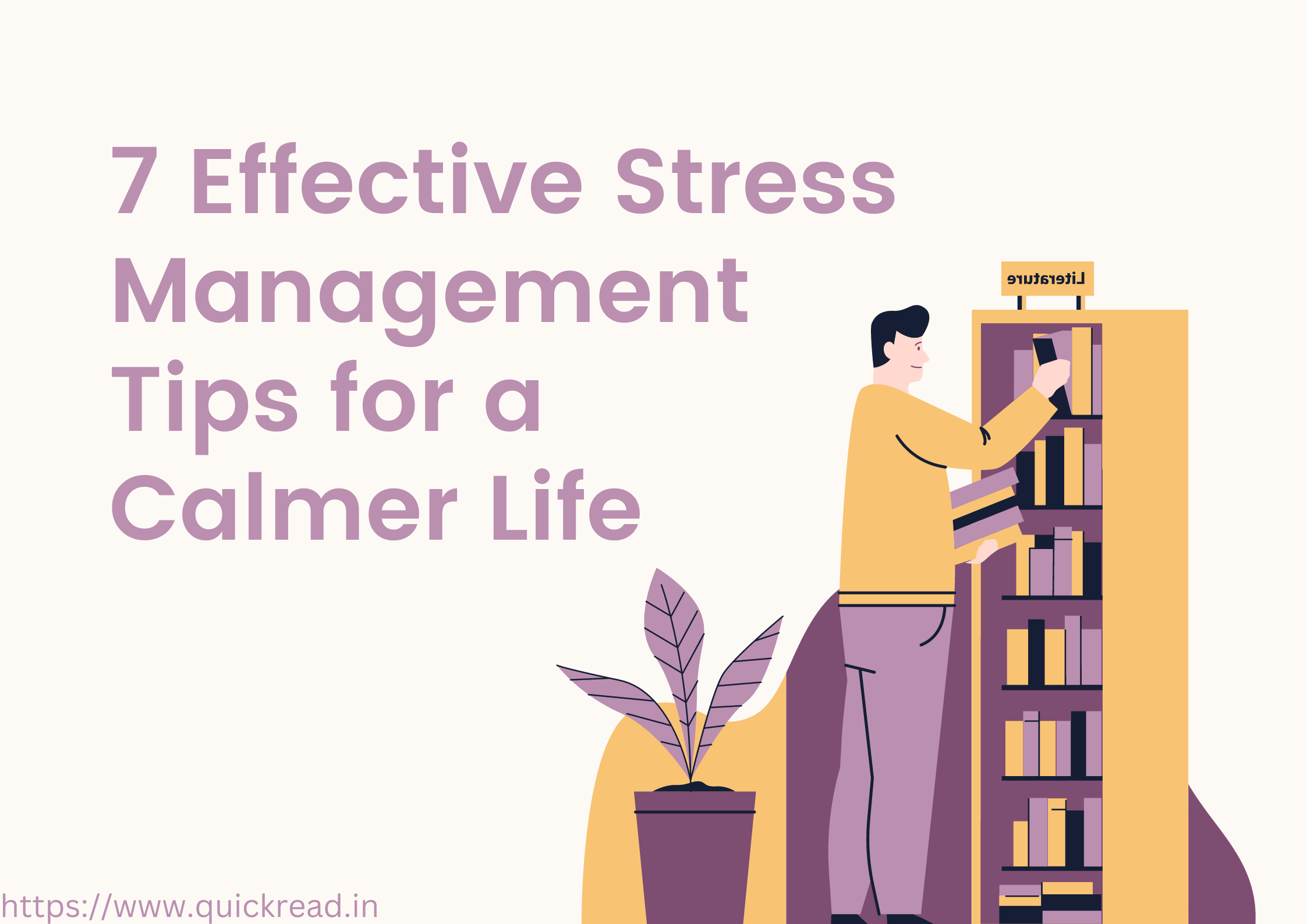Last updated on August 5th, 2023
Introduction:
Stress Management Tips: Stress has become an unavoidable part of our modern lives, and managing it effectively is essential for our overall well-being. The constant demands of work, personal responsibilities, and the fast-paced nature of society can leave us feeling overwhelmed and anxious. However, with the right strategies, stress can be managed, and a calmer life can be achieved. In this Stress Management Tips article , we will explore seven effective stress management tips that can help you regain control, reduce stress levels, and create a more peaceful and fulfilling life.
Practice Mindfulness Meditation

One powerful technique for managing stress is mindfulness meditation. This practice involves focusing on the present moment, observing your thoughts and emotions without judgment. By dedicating a few minutes each day to sit quietly and concentrate on your breath, you can cultivate a greater sense of self-awareness and calmness. Mindfulness meditation has been proven to reduce stress levels and promote overall well-being.
Engage in Regular Physical Exercise

Regular physical exercise is not only beneficial for your physical health but also plays a crucial role in managing stress. Engaging in activities such as walking, jogging, yoga, or any form of exercise you enjoy releases endorphins, which are natural mood enhancers. These endorphins help reduce stress, improve your overall well-being, and promote a calmer state of mind. Make exercise a priority in your daily routine and experience the positive impact it can have on your stress levels.
Prioritize Self-Care

Taking care of yourself is essential for managing stress and maintaining a balanced life. Set aside time every day to do things that make you happy and relaxed as part of your commitment to practising self-care. Whether it’s reading a book, taking a warm bath, pursuing a hobby, or spending quality time with loved ones, these moments of self-care rejuvenate and recharge you. Remember, self-care is not selfish but necessary for your overall well-being and resilience against stress.
Develop Effective Time Management Skills

Ineffective time management frequently causes stress and exhaustion. By organizing your tasks, setting realistic goals, and breaking larger tasks into smaller, manageable steps, you can regain control over your time. Create a to-do list, prioritize your responsibilities, and learn to delegate tasks when possible. Saying no to activities that do not align with your priorities is also important. Effective time management allows you to accomplish more while maintaining a sense of calm and balance.
Cultivate a Supportive Social Network

Having a strong support system can make a significant difference in managing stress. Be in the company of uplifting, motivating people who are supportive and positive. Engage in meaningful conversations, seek advice when needed, and offer support to others in return. Building and maintaining healthy relationships provide emotional support during challenging times and contribute to a happier and less stressful life.
Practice Relaxation Techniques
Relaxation methods might help you feel calmer and less stressed by being included into your regular routine. Deep breathing exercises, progressive muscle relaxation, and listening to calming music are effective techniques. Whenever you feel overwhelmed or tense, take a few moments to engage in these practices. They can activate your body’s relaxation response, lower blood pressure, and help you feel more at ease.
Seek Professional Help if Needed
If stress becomes overwhelming and starts to interfere with your daily life, it may be beneficial to seek professional help. A licensed therapist or counselor can provide guidance and support in developing personalized stress management strategies. Seeking help is a sign of strength and self-care, and a professional can offer valuable insights and tools to navigate through challenging times.
Conclusion
7 Effective Stress Management Tips for a Calmer Life :Managing stress is essential for leading a calmer and more fulfilling life. By implementing these seven effective stress management tips into your daily routine, you can regain control over your stress levels and improve your overall well-being. Remember to practice mindfulness, engage in regular exercise, prioritize self-care, manage your time effectively, cultivate a supportive social network, practice relaxation techniques, and seek professional help if needed. With these strategies, you can create a life filled with greater peace, balance, and resilience against stress.
FAQs related to Stress Management Tips
Q1: How long does it take to see the benefits of mindfulness meditation?
It varies from person to person, but regular practice can often yield noticeable benefits within a few weeks. Consistency and patience are key when incorporating mindfulness meditation into your routine.
Q2: Can exercise really help reduce stress?
Yes, exercise releases endorphins, which are natural mood enhancers. Regular physical activity helps reduce stress levels and promotes a calmer state of mind.
Q3: Is self-care selfish?
No, self-care is necessary for your overall well-being. Taking care of yourself allows you to recharge, manage stress better, and be more present for others.
Q4: How can I get better at managing my time?
Start by creating a to-do list, setting realistic goals, and breaking tasks into smaller steps. Prioritize your responsibilities and learn to delegate tasks when possible. Saying no to non-priority activities is also important.
Q5: When should I consider seeking professional help for stress?
If stress becomes overwhelming and starts to significantly impact your daily life, relationships, or overall well-being, it may be beneficial to seek professional help. A therapist or counsellor can offer direction and assistance catered to your unique need.


